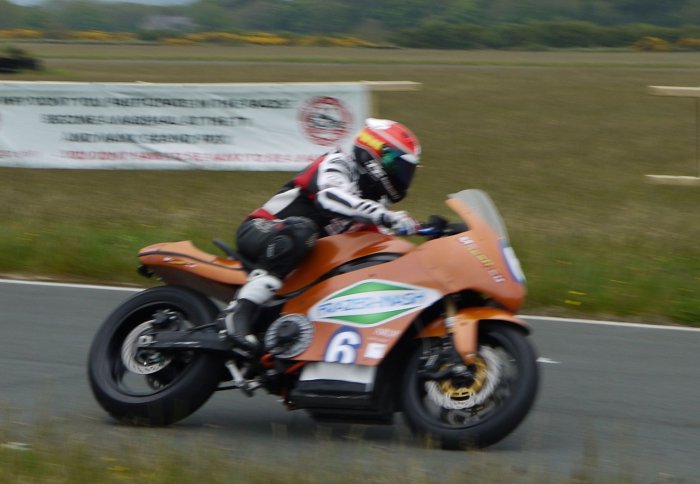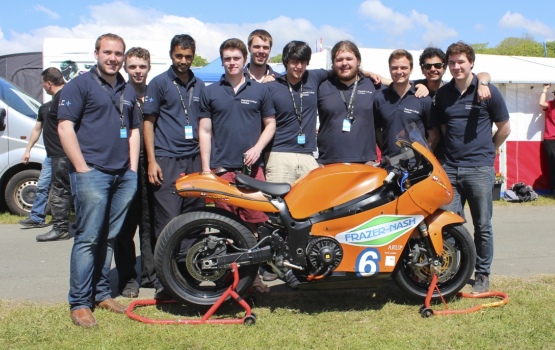Imperial team celebrate completing zero emission motorbike race
by Colin Smith

An Imperial team who built an all-electric super-bike are celebrating completing one of the world's most high profile zero emissions races.
The team, consisting of third and fourth year undergraduates from the Department of Mechanical Engineering, have come seventh in the Isle of Man TT Zero race this month. The race covers a 37 mile circuit and is considered by riders and teams to be one of the most gruelling races for electric motorbikes.
Luke Foreman, fourth year undergraduate from the Department of Mechanical Engineering, said: “When the bike finished the race we were all ecstatic! We had a lot of mechanical problems during practice, but everything worked perfectly during the race. We were in a state of disbelief when we saw the bike reaching the finishing line.”
The students were in state of disbelief because for the past four years consecutive Imperial teams have endeavoured to take part in the Isle of Man TT Zero race, but have had limited success. Two years ago, the team made it to the island but failed to complete a lap, suffering mechanical problems when the motorbike reached the difficult mountain section of the track.
Last year, the students worked hard to carry out mechanical upgrades on the motorbike, but did not complete them in time.
This year it looked like bad luck was going to strike again when their rider Antonio Maeso broke his leg two days before the race.
“We had many offers when news got out because I think a lot of riders wanted to get experience on electric motor bikes,” said Luke. “Antonio recommended David Madsen-Mygdal, who is a TT legend, has experience riding electric bikes, and holds the record for the amount of TT finishes, which made him a great choice.”
More than 80,000 visitors lined the course to watch the race, which included ten teams from around the world.
“The most nerve-racking part of the race was when the bike was out racing.” said Luke. “For the rider I think the whole course is pretty extreme with lots of hills and a particularly difficult ‘hairpin’ corner, which presented a real design challenge.”
The challenge for the team was fitting enough batteries into the bike so that it had the power to make it around the track, while keeping under the weight limit and enabling it to be handled effectively by the rider. Too many batteries can mean that the bike was very wide at the bottom, instead of being a conventional V-shape, which is better for handling on corners.
The team overcame this challenge by reducing the spacing between the batteries to make the pack smaller. They also moved the battery pack higher up to avoid it scraping along the road during sharp turns.
After the race the team celebrated by having a big barbecue and a few beers with the team from the Ohio State University. Following the barbecue the team travelled into Douglas, the capital of the Isle of Man, where they soaked up the post-race atmosphere.
Imperial was one of only four university teams to compete and the only team who uses this project to contribute towards their undergraduate degree in mechanical engineering. The project is helping successive groups of students in the Department of Mechanical Engineering to learn more about how to build low emission vehicles of the future.
As soon as the group returned to Imperial they had to write reports, make presentations and discuss their work, which is graded, making up a large proportion of their marks for the year.
Buoyed by their success, the team are already discussing plans for the future. They collected data to use in future years in developing the bike and they are hoping to secure some funding to buy new motors and components to improve the performance of the bike.
“Now we know what we are doing and what level we need to compete at there is definitely scope for Imperial to do much better in future years,” Luke added.
Article text (excluding photos or graphics) © Imperial College London.
Photos and graphics subject to third party copyright used with permission or © Imperial College London.
Reporter
Colin Smith
Communications and Public Affairs



